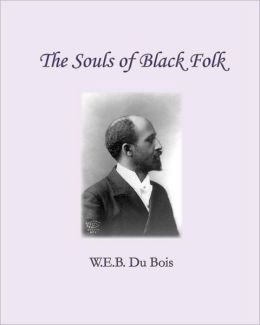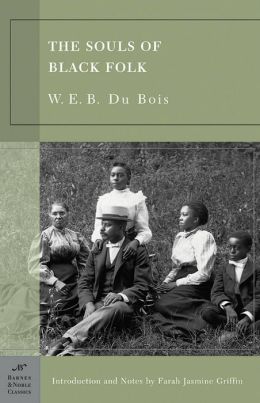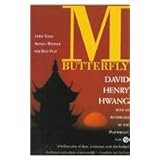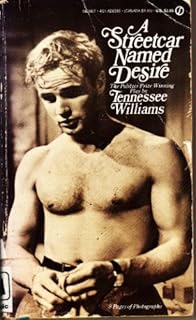First I bought the edition on the left, which is the bare bones text with no introduction, footnotes, or endnotes. Once I realized that, I bought the edition on the right because it was the only one physically in town; unless you are terribly familiar with African-American history, the South, Sorrow Songs, and the Bible, I would definitely recommend a more comprehensive text.
"Herein lies the tragedy of the age: not that men are poor, - all men know something of poverty; not that men are wicked, - who is good? not that men are ignorant, - what is Truth? Nay, but that men know so little of men."
This text is a marvelous snapshot of "the problem of the Twentieth Century" which is "the problem of the color-line." In fourteen chapters WEBDB shows so many aspects of race relations at the turn of the century beautifully (it was published in 1903). If you have any interest in education, American history, life after slavery, racism, suffrage, equality (and who isn't interested in these things?) I would definitely recommend picking up this book.
The first two chapters set up post-Emancipation life for the reader, detailing the history of the Freedman's Bureau and those govermenty details. Chapter three takes Booker T. Washington to task for his "policy of submission" that asks black people to give up political power, civil rights, and higher education in exchange for industrial education, money, and the good opinion of the South (and thus white former slave owners). WEBDB returns again and again to the importance of education and suffrage and says that "manly self respect is worth more than lands and houses, and that a people who voluntarily surrender such respect, or cease striving for it, are not worth civilizing." (It is like he is speaking to me here - because I wanted a real education, it has taken me five years to finish my MA in English instead of speeding through a pay-for-paper education program. I now am not eligible for the raise that was promised me, but I have the self respect that I earned my degree and I can face my students non-hypocritically when I tell them that education is the most important thing.)
The fourth chapter details his teaching experience in incredibly rural Tennessee. The fifth and sixth return to education.
Chapter seven, "Of the Black Belt," is a sad tour of the almost entirely-black areas of Georgia that shows the damage of tenant farming and how it's a program that is just designed to keep blacks poor. Chapter eight extends the critique of tenant farming, but also analyzes the family structure and marriage rituals at the time.
Chapter nine looks at the crime rate and the education system, and so much of what he said in 1903 still rings true today 110 years later. "The chief problem in any community cursed with crime is not the punishment of the criminals, but the preventing of the young from being trained to crime." In one of my writing classes, a student wrote a narrative about bringing a gun to school when he was in junior high. Throughout the narrative were moments where someone could have stepped in and altered the course of events: the kids who were bullies, the kids who saw the bullies, the teachers who just assume that's how middle school boys act, the student who didn't reach out to a grown up who would do something, the older brother/gang member who gave his younger brother access to his gun....maybe ONE change in actions wouldn't have changed the events, but a series of actions could have...and listening to my student's narrative, I could understand why he did what he did. Guns in school are probably my number one fear - I don't want to get shot, and I don't want to watch one of my kids get shot, and I really really don't want to see one of my kids shoot someone, but I got why he brought a gun to school. He was sick of being messed with and he wanted it to stop. He felt powerless and he wanted to feel powerful. He didn't feel that there was any other way to handle the situation. He didn't shoot anyone, he was placed in an alternative school for the year, and he is still in school trying to finish his high school diploma (also he can be a damn compelling writer when he's inspired), but we need to have a better system in place so that our young aren't compelled to that in the first place (middle school children in Las Vegas are 10-14 years old).
Chapter ten covers religion. Chapter eleven is a horrible story of WEBDB's first born child dying as a baby, and so much of this reminded me of HJ's complex reaction to her own children's sickness. Of course, she wanted her children to live, but she did wonder if it were better for them to die rather than live as slaves. WEBDB says to his dead child, "Not dead, not dead, but escaped; not bond, but free...well sped, my boy, before the world had dubbed your ambition insolence, had held your ideals unattainable, and taught you to cringe and bow."
Chapter twelve is the story of Alexander Crummell, and the final chapter on Sorrow Songs reveals the connection of the song "Swing low, sweet chariot" to Alexander Crummell (it was his funeral song). It is a song that we play sometimes in my ukulele club, and I have always loved it and felt it was powerful, so I started this chapter incredibly excited.
Chapter thirteen is a story to break your heart. WEBDB sets up parallel Johns, a black John whose father was a slave, and a white John whose uncle owned John's father. They both go to college in the same town, have a few encounters, and return home at the same time. I have nothing to say that the Judge doesn't say better.
The Judge about his son white John going to college: "It'll make a man of him. College is the place."
The Judge about black John going to college: "It will spoil him."
The Judge when John returns from college to teach in town: "Well, John, I want to speak to you plainly. You know I'm a friend to your people. I've helped you and your family, and would have done more if you had n't got the notion of going off. Now I like the colored people, and sympathize with all their reasonable aspirations; but you and I both know, John, that in this country the Negro must remain subordinate, and can never expect to be the equal of white men. In their place, your people can be honest and respectful; and God knows I'll do what I can to help them. But when they want to reverse nature, and rule white men, and marry white women, and sit in my parlor, then by God! We'll hold them under if we have to lynch every Nigger in the land. Now, John, the question is, are you, with your education and Northern notions, going to accept the situation and teach the darkies to be faithful servants and laborers as your fathers were - I knew your father, John, he belonged to my brother, and he was a good Nigger. Well - well, are you going to be like him, or are you going to try to put full ideas of rising and equality into these folks' heads, and make them discontented and unhappy? (emphasis mine)
Chapter thirteen does not have a happy ending.
Chapter fourteen discusses the bar of music that begins each chapter, which I think I'll end up pursuing further because as a non-church goer, I have not heard most of these songs before. (The YouTube is all about the Beyonce version, but I think there are much better ones including of course the lovely and incomparable Etta James's. However, I like the range of emotion in The Plantation Singers' version.)
"Herein lies the tragedy of the age: not that men are poor, - all men know something of poverty; not that men are wicked, - who is good? not that men are ignorant, - what is Truth? Nay, but that men know so little of men."
This text is a marvelous snapshot of "the problem of the Twentieth Century" which is "the problem of the color-line." In fourteen chapters WEBDB shows so many aspects of race relations at the turn of the century beautifully (it was published in 1903). If you have any interest in education, American history, life after slavery, racism, suffrage, equality (and who isn't interested in these things?) I would definitely recommend picking up this book.
The first two chapters set up post-Emancipation life for the reader, detailing the history of the Freedman's Bureau and those govermenty details. Chapter three takes Booker T. Washington to task for his "policy of submission" that asks black people to give up political power, civil rights, and higher education in exchange for industrial education, money, and the good opinion of the South (and thus white former slave owners). WEBDB returns again and again to the importance of education and suffrage and says that "manly self respect is worth more than lands and houses, and that a people who voluntarily surrender such respect, or cease striving for it, are not worth civilizing." (It is like he is speaking to me here - because I wanted a real education, it has taken me five years to finish my MA in English instead of speeding through a pay-for-paper education program. I now am not eligible for the raise that was promised me, but I have the self respect that I earned my degree and I can face my students non-hypocritically when I tell them that education is the most important thing.)
The fourth chapter details his teaching experience in incredibly rural Tennessee. The fifth and sixth return to education.
Chapter seven, "Of the Black Belt," is a sad tour of the almost entirely-black areas of Georgia that shows the damage of tenant farming and how it's a program that is just designed to keep blacks poor. Chapter eight extends the critique of tenant farming, but also analyzes the family structure and marriage rituals at the time.
Chapter nine looks at the crime rate and the education system, and so much of what he said in 1903 still rings true today 110 years later. "The chief problem in any community cursed with crime is not the punishment of the criminals, but the preventing of the young from being trained to crime." In one of my writing classes, a student wrote a narrative about bringing a gun to school when he was in junior high. Throughout the narrative were moments where someone could have stepped in and altered the course of events: the kids who were bullies, the kids who saw the bullies, the teachers who just assume that's how middle school boys act, the student who didn't reach out to a grown up who would do something, the older brother/gang member who gave his younger brother access to his gun....maybe ONE change in actions wouldn't have changed the events, but a series of actions could have...and listening to my student's narrative, I could understand why he did what he did. Guns in school are probably my number one fear - I don't want to get shot, and I don't want to watch one of my kids get shot, and I really really don't want to see one of my kids shoot someone, but I got why he brought a gun to school. He was sick of being messed with and he wanted it to stop. He felt powerless and he wanted to feel powerful. He didn't feel that there was any other way to handle the situation. He didn't shoot anyone, he was placed in an alternative school for the year, and he is still in school trying to finish his high school diploma (also he can be a damn compelling writer when he's inspired), but we need to have a better system in place so that our young aren't compelled to that in the first place (middle school children in Las Vegas are 10-14 years old).
Chapter ten covers religion. Chapter eleven is a horrible story of WEBDB's first born child dying as a baby, and so much of this reminded me of HJ's complex reaction to her own children's sickness. Of course, she wanted her children to live, but she did wonder if it were better for them to die rather than live as slaves. WEBDB says to his dead child, "Not dead, not dead, but escaped; not bond, but free...well sped, my boy, before the world had dubbed your ambition insolence, had held your ideals unattainable, and taught you to cringe and bow."
Chapter twelve is the story of Alexander Crummell, and the final chapter on Sorrow Songs reveals the connection of the song "Swing low, sweet chariot" to Alexander Crummell (it was his funeral song). It is a song that we play sometimes in my ukulele club, and I have always loved it and felt it was powerful, so I started this chapter incredibly excited.
Chapter thirteen is a story to break your heart. WEBDB sets up parallel Johns, a black John whose father was a slave, and a white John whose uncle owned John's father. They both go to college in the same town, have a few encounters, and return home at the same time. I have nothing to say that the Judge doesn't say better.
The Judge about his son white John going to college: "It'll make a man of him. College is the place."
The Judge about black John going to college: "It will spoil him."
The Judge when John returns from college to teach in town: "Well, John, I want to speak to you plainly. You know I'm a friend to your people. I've helped you and your family, and would have done more if you had n't got the notion of going off. Now I like the colored people, and sympathize with all their reasonable aspirations; but you and I both know, John, that in this country the Negro must remain subordinate, and can never expect to be the equal of white men. In their place, your people can be honest and respectful; and God knows I'll do what I can to help them. But when they want to reverse nature, and rule white men, and marry white women, and sit in my parlor, then by God! We'll hold them under if we have to lynch every Nigger in the land. Now, John, the question is, are you, with your education and Northern notions, going to accept the situation and teach the darkies to be faithful servants and laborers as your fathers were - I knew your father, John, he belonged to my brother, and he was a good Nigger. Well - well, are you going to be like him, or are you going to try to put full ideas of rising and equality into these folks' heads, and make them discontented and unhappy? (emphasis mine)
Chapter thirteen does not have a happy ending.
Chapter fourteen discusses the bar of music that begins each chapter, which I think I'll end up pursuing further because as a non-church goer, I have not heard most of these songs before. (The YouTube is all about the Beyonce version, but I think there are much better ones including of course the lovely and incomparable Etta James's. However, I like the range of emotion in The Plantation Singers' version.)







